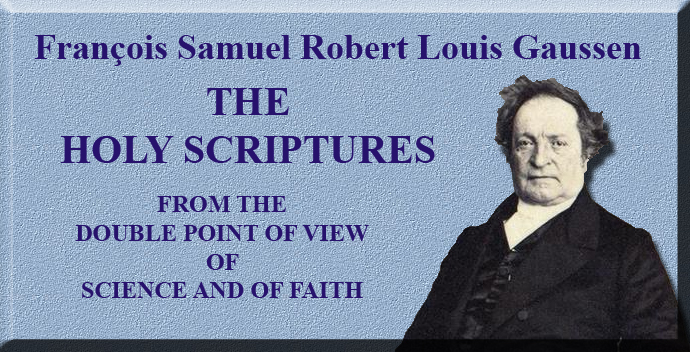
The Holy Scriptures
From the Double Point of View of Science and of Faith
By François Samuel Robert Louis Gaussen
Part Second - The Method of Faith
Book 1 - The Two Methods Open for the Knowledge of the Canon
|
401. WE are come to what, after all, forms the surest foundation of our confidence relative to the entire collection of the Scriptures. But it will be necessary, before entering on this important subject, to premise two observations. The first is, that our inquiry is no longer confined to the New Testament. Henceforward we shall treat of the entire canon. In the second place, we feel bound to forewarn the reader that, in this Second Part of our task, we do not address exactly the same class of persons as in the first. In the preceding pages, our arguments were presented indifferently to believers and unbelievers. Henceforward it is sufficiently evident, that in explaining reasons of faith we address ourselves to men of faith — to readers who, without being quite clear respecting the entire collection of our sacred books, are yet persuaded that, in a part at least of what the Scripture calls “the oracles of God,” it is God himself who speaks to us; so that there its teachings must be received with all confidence as given by “the Holy Spirit, sent down from heaven.” 402, To you, then, earnest though unconfirmed Christians, we shall henceforward speak of the canon; to you, who read with reverence what you acknowledge of the Scriptures, and who wish with an upright heart to serve the living and true God according to His Word, and to wait for His Son Jesus from heaven, who will soon judge the living and the dead by that Word. We appeal to that part of the Scriptures which you acknowledge and revere, and from this our arguments will be taken. 403. Let it be carefully noted, we are not here taking the question for granted; nor shall we attempt to establish it by anything contained in itself. When we appeal to the faith to justify the canon in all its parts, when we avail ourselves for this purpose of a positive dogma, when we draw this dogma from the New Testament, reduced, if you please, to narrower dimensions, we by no means place the Christian reader in an illogical circle, since this positive dogma is given us by a part of the Scriptures that none of the adversaries of the canon have ever called in question; not even Marcion, nor Basilides, nor Heracleon, nor Ptolemy; not even, in our own day, the Tubingen school. Moreover, we shall confirm its sense and value by the conduct of God during all the ages of His antecedent revelations, and by.an assemblage of striking and incontestable facts. Yet, before expounding this doctrine of the canon, and passing in this manner from the method of science to that of faith, it will be desirable to compare in some points these two sources of information, and the two kinds of conviction they are fitted to produce.
|
|
 |
 |
|
|
|
-
Site Navigation
 Home
Home What's New
What's New Bible
Bible Photos
Photos Hiking
Hiking E-Books
E-Books Genealogy
Genealogy Profile
Free Plug-ins You May Need
Profile
Free Plug-ins You May Need
 Get Java
Get Java.png) Get Flash
Get Flash Get 7-Zip
Get 7-Zip Get Acrobat Reader
Get Acrobat Reader Get TheWORD
Get TheWORD